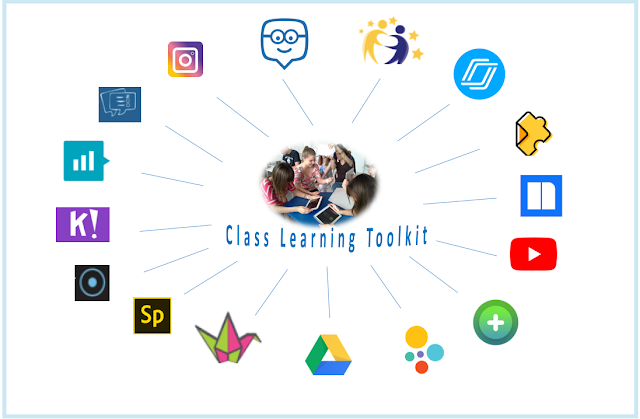Class Learning Toolkit
Inspired by Barbara Bray's post Build a Toolkit so Learners Become Future Ready, I created my Class Learning Toolkit:

I divided it into 5 categories, based on the skills I want my students to develop:
Project and Task Management
eTwinning, the European community for schools – the teacher connects with colleagues from all over Europe to carry out international projects integrated in their curricula. The teacher can also use eTwinning for professional development as numerous lifelong learning opportunities are provided for teachers on the platform. Students use it to collaborate with peers and to create new content.
Skills development: organizational and task management skills, collaboration, teamwork, leadership skills, problem solving and creativity
Knowledge Building
Nearpod – the teacher creates presentations and adds interactive elements, such as quizes, collaborative boards, discussion questions. The responses are saved in the report. Students are actively engaged in presentations.
Edpuzzle – the teacher creates interactive videos, adds questions and assgins the videos to students. Students watch the video or parts of the video as many times as they need and answer the questions. Edpuzzle is ideal for the flipped classroom approach.
Skills development: observation, attention to detail, curiosity, learning to learn
Newsela – graded news articles the teacher assigns articles based on their students language level and adds reading comprehension questions and short writing assignments. Students read the news article suitable for their level.
Skills development: reading, information literacy
YouTube, Ted Talks, Khan Academy – the teacher selects videos or creates channels for students to watch. The videos can be made interactive and assigned via Edpuzzle. Skills development: listening
Flipgrid – the teacher creates a task and students reply by recording themselves. Voicethread, Recap and Vocaroo can also be used for the enhancement of speaking skills.
Skills development: speaking
Spiral – the teacher can use Spiral Discuss tool to assign discussion topics to students. They write their answers and share them with the teacher and their classmates. All the responses are saved in a report, but in the classroom they can be displayed anonymously.
Skills development: writing
Teamwork and Content Creation
Google Drive – the teacher shares documents, sheets or slides for students to work on together. Students collaborate, help each other, edit their work together or give suggestions for improvement.
Adobe Spark – students create multimedia presentations. Instead of a presentation they can also create e-books (Madmagz, Isuu) or cartoons (Pixton, Makebelief Comics). Spiral TeamUp can be used to create collaborative presentations.
Screencast-o-matic – students create tutorials on topics they have mastered or what they want to share with their peers. Powtoon, MySimpleShow, PixiClip or Educreations can also be used to create tutorials.
Skills development: collaboration, teamwork, leadership skills, initiative, creative and critical thinking skills, presentational skills
Assessment and Evaluation
Kahoot – the teacher creates a quiz check understanding. Students can play individually or in teams. Kahoot is also good for the assessment of prior knowledge (Blind Kahoot).
Mentimeter – the teacher can easily create quick formative assessment tasks, exit and admit slips in the form of open-ended or multiple choice questions and word-clouds. Spiral Quickfire is another excellent tool for quick formative assessment.
Tricider – students add ideas and give arguments for and against.
Skills development: self-reflection, self-assessment, peer-assessment, critical thinking
Dissemination
Instagram – the teacher creates a class account. Students share their work with a global audience. Twitter and Facebook can also be used, as well as blogs (Wordpress, Blogger, Tumblr) or the new Google Sites, a user-friendly collaborative platform.
Instagram – the teacher creates a class account. Students share their work with a global audience. Twitter and Facebook can also be used, as well as blogs (Wordpress, Blogger, Tumblr) or the new Google Sites, a user-friendly collaborative platform.
Skills development: digital content curation and sharing, critical thinking